
- Homepage
- Antique
- Binding
- 1 / 2 Leather (2)
- 3 / 4 Leather (2)
- Brochure / Pamphlet (4)
- Cloth (87)
- Disbound (3)
- Fine Binding (52)
- Hard Back (2)
- Hard Cover (4)
- Hardback (6)
- Hardcover (888)
- Hardcover Sheepskin (2)
- Hardcover W / Jacket (5)
- Hardcovers (2)
- Leather (251)
- Original Blue Cloth (2)
- Quarter Leather (3)
- Softcover (3)
- Softcover, Wraps (41)
- ... (3529)
- Format
- Theme
- Type
- Action Figure (4)
- Banknotes (9)
- Belt (5)
- Belt Buckle (25)
- Bowie (12)
- Church Pew (4)
- Civil War Token (24)
- Hand-colored (6)
- Hardcover (9)
- Medal (9)
- Merchant Token (12)
- Painting (3)
- Photograph (182)
- Photograph Album (7)
- Pocket Watch (5)
- Print (5)
- Shank Button (4)
- Soldier (4)
- Soldiers (4)
- Sword (7)
- ... (4548)
- Unit Of Sale
Antique Photos USS Constitution Model Ship Built Civil War Capt William F Spicer
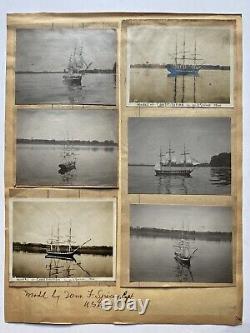
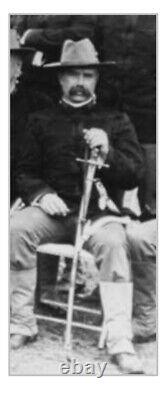
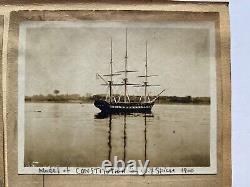
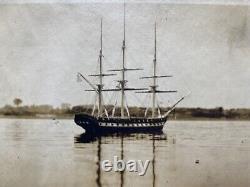


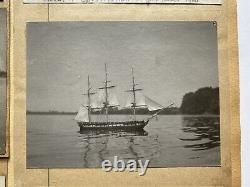
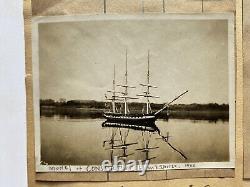
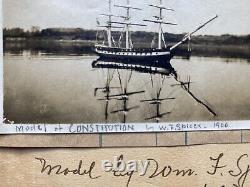
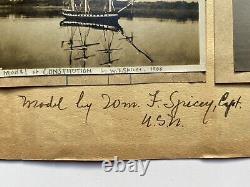

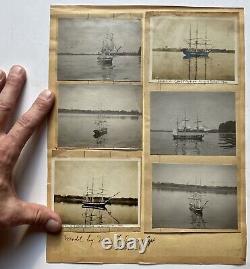



Spicer see photo 2 for an image of Spicer which is not included but for reference purposes only. The base of the paper boasts a period ink inscription identifying the maker. Each photo in Excellent overall condition; clean and crisp with no holes, rips or tears. Each photo measures 3 1/4" x 4 1/4" and the full sheet measures 12 3/8" x 9 3/8".
FATHER AND SON BECAME LOCAL HEROES IN TWO WARS. In the history of our nation, many sons have following in the footsteps of their fathers when serving in the military during successive conflicts. One such pair in Winchester included the heroic figures of Commodore William F. Spicer, a veteran of the Civil War, and his son William F. A participant in the Spanish-American War who became the third person in the nation to receive the Congressional Medal of Honor.
Spicer (1820 - 1878), a native of New York, entered the navy in 1939 and rose through the ranks from midshipman to commodore. He arrived in Winchester shortly before 1860 as Lieutenant Spicer.Prior to the Civil War, Spicer had a varied career, sailing to the west coast of Africa, the Mediterranean, the Orient, and the Danish West Indies. 3 They married in New York.
Their children were born in the West Indies, Italy, and Massachusetts, including Winchester. 4 They established a home in Winchester while Spicer was stationed at the Charlestown Navy Yard. Spicer was reportedly a man of excellent qualities and generous impulses.He also had a musical bent. During his youthful years in the Navy, he composed some popular ballads, among which are "Absent Friends and You, Mary, " "The Gale, " "All Hands, Up Anchor, " "Off Sicily's Isles, " "The Date of'39, " and The Last Voyage. He was a member of the Military Order of the Loyal Legion of the United States and of the Swedenborgian Church. However, he saw much more action during the Civil War.
After the war broke out, he was promoted to Lieutenant Commander and Commander. With the latter rank, he left Boston to join the Atlantic Blockading Squadron and during that service commanded the U. Quaker City and participated in the attacks on Fort Fisher. In 1865, he was on special duty at the Portsmouth Navy Yard and was once more in Boston from 1869 to 1872, on equipment. His family lived there and in Charlestown through his death. Commodore Spicer died at the Charlestown Navy Yard and was buried at Wildwood Cemetery. According to his obituary, Minute guns were fired as the funeral cortege moved away from the house, in front of which gathered a number of naval officers and prominent citizens to pay their tribute of respect. Twenty years after Commodore Spicer's death, enmity between Spain and the United States, provoked by the explosion of the Maine at anchor in Havana Harbor on Feb. 15, 1898 and other causes, escalated to the point that war was declared that April. All of Spicer's sons contributed to the war effort in some manner, with his namesake, William F. Born in the West Indies, this Spicer lived a few years in Italy but essentially grew up in Winchester. Reportedly, he had always been a marine since he was old enough to carry a cutlass.Like his father, he rose through the ranks and traveled to some exotic ports. 5 At the time of his father's death, he was assigned to the Boston Navy Yard. He held the rank of captain when the battleship Maine was blown up and his country went to war with Spain.
Spicer sailed to Cuba, in command of Company D in the First Marine Battalion. He led the first landing party of marines-he reportedly was himself the first man ashore-and took part in the battle of Guantanamo.The Spanish-American War was infamous for jungle- and disease- related casualties. Conditions in Cuba were hard on Americans, and Spicer (then age 47) was not immune to them. During a mission described by author Stephen Crane (who accompanied the detachment), in June 1898, Spicer was in command of a detachment of 160 marines6 assigned to go to Cuzco, six miles down the coast from Guantanamo Bay, to destroy a guerilla encampment guarding the only well in the area.
Half-way to their destination along the jungle trails, Spicer fell victim to heat stroke, as did 19 other marines in the detachment, and was rescued by a stretcher party from the U. Dolphin which was taking a parallel track. The mission was accomplished under other command. The conditions did not keep Spicer down.The local paper that July reported an unusual incident during the war when Spicer on short notice organized a detail of army cooks at Caimanera and manning whatever guns were not in the hands of the guard, protected the camp against an unexpected onslaught by the Spanish. Spicer survived the war and was given further assignments. Through at least 1900, his home residence of record was Winchester (where the family had moved to Highland Avenue by 18937). By 1910, he had attained the rank of Lt. Colonel and moved with his wife and sons to Lexington.
He later lived in Charlestown. The rest of the family disbursed to other parts of the country, leaving Commodore Spicer and an infant daughter to rest alone at Wildwood. Please enjoy the photos for further item details and if you have any questions feel free to ask. Thank you and be sure to check out our other listings!

